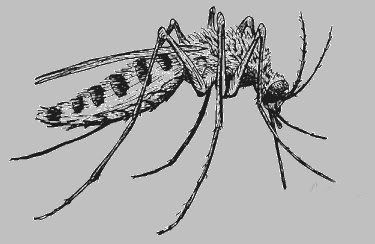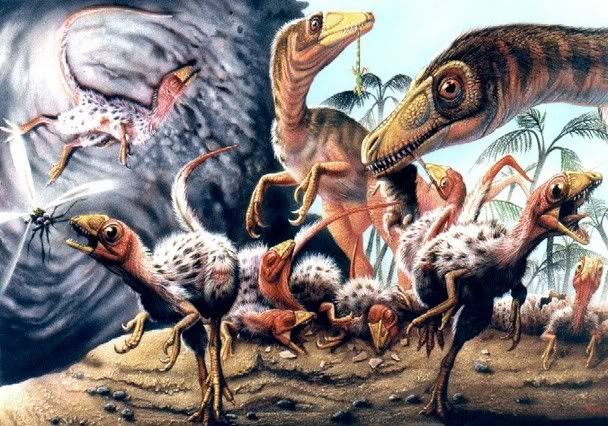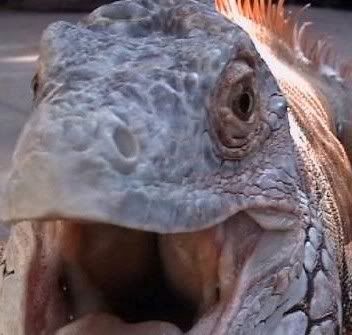Scipionyx: Cousins from outer space?
Image Source: Luis V. Rey's Art Gallery Dinosaurs and Paleontology © Luis Rey
Image Source: Luis V. Rey's Art Gallery Dinosaurs and Paleontology © Luis Rey
An amazing Manhattan parrot has excited UK scientists prompting a review of the astounding story of a remarkable reptile in the Baltic that first appeared nearly a decade ago. Also, parched conditions in Australia confer one unexpected blessing and our look at Amazing History recalls the Day that New York women became outlaws for smoking in public.
We don't need to be reminded that these do indeed seem to be strange times and some religious fundamentalists may be forgiven for seeing omens of an approaching "End of Days" in the various proliferations of odd phenomena surrounding us. This sort of Doomsday thinking has typically been prevalent among Christians at the close of one millennium and the start of another. However, everybody is not on the same millennial page. The festival of the Fire Pig beginning next month is Year 4704 by Chinese calculations. According to the Jewish calendar it's year 5767, Muslims have just rung in Year 1428 of the Islamic calendar and this is the 5107th Hindu calendar year.

Religious perspectives aside we are witnessing an onslaught of bizarre, often unsettling events and freak behaviors. And that's just in Washington, DC. Late last month, British researchers were reported to be studying an African Grey parrot kept in New York that not only mimics human speech but has a vocabulary of 950 words, demonstrates a sense of humor, invents words and phrases, and even shows signs of telepathy, astounding scientists. The bird, named N'kisi, is believed to be one of the most advanced human language users in the animal world.
Gabby Grey: "Gentlemen, I said I wanted a CRACKER not these blasted blocks!"
Professor Donald Broom, of the University of Cambridge School of Veterinary Medicine, told BBC News Online: "The more we look at the cognitive abilities of animals, the more advanced they appear, and the biggest leap of all has been with parrots." Actually that's not quite true. The biggest leap came nearly 10 years ago with lizards or rather with one particular reptile. It's time to revisit the curious case of the "Talking Lithuanian Lizard" first reported in The Amazing Realms of Prof. Kurt S. Jacobi back in April 1998:
First the bad news, astronomers have discovered a giant asteroid hurtling toward Earth that may very well strike the planet in the year 2028 and send humankind the way of the dinosaurs.
The good news is that on-going research by Latvian paleontologists may suggest that not ALL dinosaurs perished in a previously theorized primordial cosmic collision but survived due to the timely intervention of reptilian extra-terrestrials who ferried their terran cousins to a home planet. Latvian research team leader, Dr. Valerian Livani says uncovered evidence has led to speculation that these intelligent visitors might be persuaded to return in time to help Earth avoid a second smash-up.
The source of these sensational claims is an extraordinary zoological oddity known for years locally as "Larry the Talking Lithuanian Lizard," a Vilnius sideshow attraction that drew serious scientific attention only last September (1997). A Lett researcher, Ivan Pavilosta, visiting relatives in Varena chanced upon the remarkable reptile when he took his nephew to the circus.
What first appeared to be an over-sized Baltic Spotted Gecko that could bark a series of guttural sounds on command, turned out to be the herpetological find of the century, if not the millennium. Bargaining with the lizard's owner, an acrobat from Minsk, Pavilosta paid the equivalent of four thousand dollars for the animal with which he quickly returned to the university at Riga. Upon closer examination of the 17-inch-long creature, experts were stunned.Loudmouth Lizard: Knows more than he lets on to Letts
Dino-Mite
For one thing, Larry is not any type of lizard known to modern science. He does, however, bear strong structural similarities to the fossil of a small dinosaur, Scipionyx samniticus, recently discovered in Italy and thought to be an ancestor of modern birds. Larry not only can mimic human speech far better than any parrot but can also read in six languages including English and Russian. It was only after noticing the lizard apparently engrossed in a copy of War and Peace, that Pavilosta decided to purchase the animal from the circus performers.
Actual inter-species communication with Larry did not begin until Dr. Livani and the other scientists accidentally left his open cage near a computer and the reptile began skittering across the keyboard, producing what initially seemed to be gibberish but later turned out to be a passage from the Old Testament Book of Ecclesiastes in Hungarian. Four days later, he tapped out the first four paragraphs of the Preamble to the U.S. Constitution in flawless French.
According to Larry super-intelligent reptiles such as himself occur in nature only once in every 500,000 hatchings and then only among four species of European lizard-like creatures small enough to escape undue attention from most humans. Endowed with telepathic powers and able to communicate with mammals and birds, Larry says normal reptiles are too dense for a decent conversation. He suggests that he deliberately allowed himself to be "captured and tamed" in order to study Homo sapiens at close range.
Jurassic Bark Worse than Bite
The lizard claims congenital knowledge of the Age of Dinosaurs and says a breed of omnivorous four-foot tall reptiles actually ruled the Earth for about 100 million years and escaped the planet aboard alien spacecraft just before the last asteroid collision. These reptiles implanted a genetic code in four surviving species programmed to manifest itself every century or so. As a rule, Larry says these super-lizards generally avoid people and do not try to influence human events. "Pointless," he confides. The approaching asteroid is a source of concern to Larry and others of his kind. They, about 700 in all, expect to be rescued by their interplanetary relatives well before the Big Rock gets too close.
Dr. Livani and his team are baffled by these reptile revelations and have trouble accepting much of the material. "Just because a lizard can speak, read and write (and bark)," he says, "doesn't necessarily mean that the creature is always truthful or not given to delusion. We retain a healthy scientific skepticism." Livani concludes, "All we know for certain right now is that he can beat any of us at chess and that he prefers beef stroganoff (a dish he was fed at the circus) to insects."
Since reporting those details nine years ago, a shroud of official secrecy and academic controversy has descended over the lizard case. For the record, Dr. Livani (from Latvijas Universitate) says he can comment nothing further about the animal or its present whearabouts. European herpetologists concede that geckos are the best vocalists in the reptilian world but note that they are usually confined to warmer climates and none have ever been detected north of the Riviera. Many Latvians, meanwhile, object to calling the animal "Lithuanian" in the first place. They suggest it had probably been stolen from a pet shop in Skrunda near a gigantic Soviet-era radar installation whose powerful emanations, they suspect, invested the imported reptile with remarkable powers. "He really ought to be nicknamed The Skrunda Skink," quipped one Lett.

AMAZING STORY UPDATES… The severe drought that has gripped most of Australia in recent months is having one beneficial side effect. The advance of a variety of over-sized mutant mosquitos ("mozzies" in the local parlance) seems to have been checked. The South Australian Royal Entomological Research Station says none have turned up in any of the nation's coastal cities, much to the relief local health agencies. The monster mozzies, eight times the size of a normal mosquito, were not reported to feed on human blood but to drain transmission fluid from expensive imported automobiles. And this has had a few Aussies suspect the creatures were the product of some Japanese or German experiment (possibly conducted in Malaysia) that went awry. Whatever their origin, says Dr. Barry Corrigan from Brisbane, "it seems this larger breed cannot find enough stagnant water in which to reproduce normally. And for that we should be grateful."...Our intrepid Irish-Iraqi psychic-urologist Mohammed Mohoney has confirmed that while in Sydney next April to attend an oncosexology symposium, he will also be a featured speaker at a Darlinghurst Psychic Fair organized by his uncle Syed al-Rashid who emigrated to New South Wales three years ago...Closer to home here in Florida, there seems to have been a fresh round of chupacabra sightings in the Western Everglades. Herschel Gomez is on the case and we'll have more on that as developments warrant.
ON THIS DATE IN AMAZING HISTORY…
22 JANUARY 1901
After 63 years, Royal Mail stops sale of the Queen Victoria postage stamps series and begins the King Edward VII series. Among the many RM firsts under Her Royal Highness were: First adhesive stamp (the Penny Black 1840); First post boxes erected in mainland Britain (1853); Ten London postal districts established (1858); Post Office begins telegraph service (1870); First use of bicycles to deliver mail (1880) Postal order introduced (1881); Parcel post begins (1883); First picture postcards (1894). No such major Post Office innovations occur under the nine-year reign of Edward but with grandson George V national telephone service begins (1912).
22 JANUARY 1908

Responding to a national crusade waged by Lucy Page Gaston and her Anti-Cigarette League of America, New York City passes the Sullivan Ordinance, a regulation prohibiting women from smoking in public; other municipalities follow New York's example. Anti-smoking laws are also adopted in the states of Arkansas, Utah, Idaho, Kansas, Iowa and Tennessee. All fail to curb the national tobacco habit and are all repealed by 1927. Lucy herself is struck by a streetcar and dies in 1924 by which time US smoking increases dramatically (from 4.4 billion to 73 billion cigarettes yearly) since the 1899 onset of her anti-smoking campaign.
Above: Lucy Page Gaston: Out, out damned butt!





































0 Comments:
Post a Comment